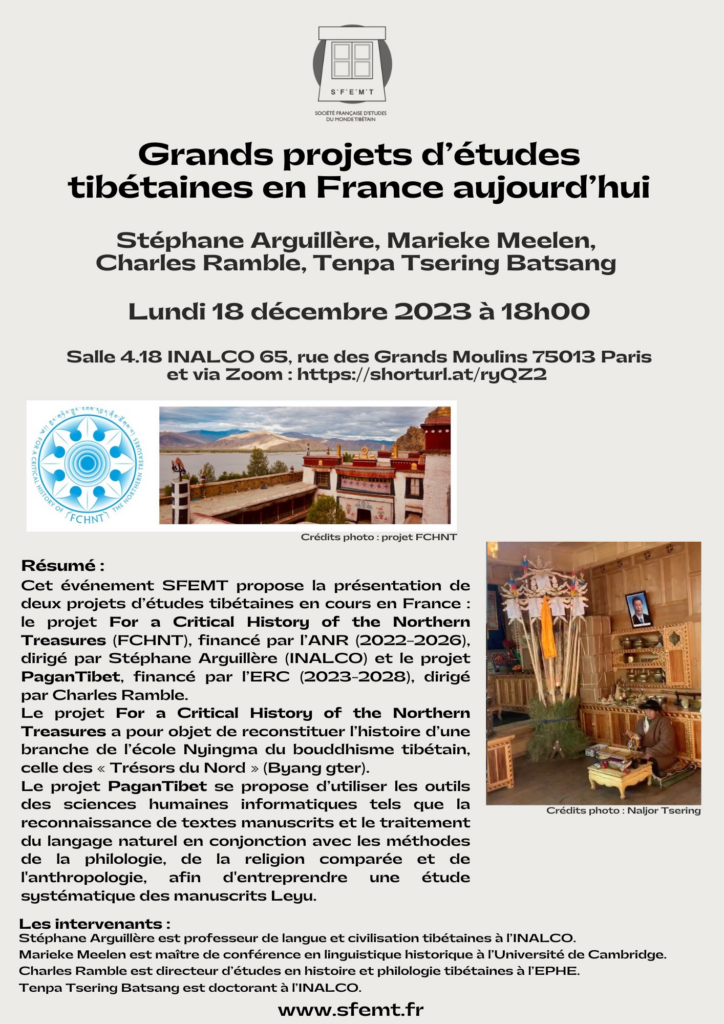La SFEMT a le plaisir d’annoncer la tenue, dans le cadre du Cycle Conférences SFEMT 2023/2024, de la conférence suivante :
Grands projets d’études tibétaines en France aujourd’hui
par Stéphane Arguillère (INALCO), Marieke Meelen (Université de Cambridge), Charles Ramble (EPHE), Tenpa Tsering Batsang (INALCO)
le lundi 18 décembre 2023 en salle 4.18 INALCO 65, rue des Grands Moulins 75013 Paris et via Zoom : https://shorturl.at/ryQZ2
Cet événement SFEMT propose la présentation de deux projets d’études tibétaines en cours en France : le projet For a Critical History of the Northern Treasures (FCHNT), financé par l’ANR (2022–2026), dirigé par Stéphane Arguillère (INALCO) et le projet PaganTibet, financé par l’ERC (2023-2028), dirigé par Charles Ramble.
Les deux projets :
Le projet FCHNT (For a Critical History of the Northern Treasures), financé par l’ANR (2022–2026), a pour objet de reconstituer l’histoire d’une branche de l’école Nyingma du bouddhisme tibétain, celle des « Trésors du Nord » (Byang gter). Avec la publication en 2015 d’une collection en 63 volumes de la littérature de cette école, une masse énorme d’informations est devenue accessible ; mais, outre ce qui se trouve synthétisé dans le volume 62 (qui est entièrement consacré à une chronique de cette tradition), les détails doivent être tirés de l’ensemble du corpus et d’autres documents. L’équipe rassemblée autour de se projet (coordinateur scientifique : Stéphane Arguillère (Inalco / IFRAE) ; membres titulaires : Jean-Luc Achard (CNRS) et Jay Valentine (Troy University) ; autres membres : Cécile Ducher (post-doctorante IFRAE), Tenpa Tsering Bastang (doctorant IFRAE) et Simon Martin) travaille donc à une traduction du volume 62 largement complétée par les apports des autres sources.
Reconstructing the Pagan Religion of Tibet: Most of what we know about early Tibetan religion comes from a small number of texts from Dunhuang, a small cache found in Gathang Bumpa stupa, southern Tibet, and some ritual narratives in the literature of Yungdrung (“Everlasting”) Bon. This situation changed in 2005 with the discovery of a large number of manuscripts constituting the ritual repertoire of a class of priests, called Leyu (Tib. le’u), in the Sino-Tibetan borderlands. Although facsimiles of some 35,000 folios of these manuscripts have now been, or are due shortly to be, published in China, few people have worked on them owing to difficulties of script, language and the contexts of the ritual narratives they contain. Preliminary investigations suggest that these texts contain non-Buddhist rituals and narratives closely resembling those of the early sources that are already known. Using computational humanities tools such as Handwritten Text Recognition and Natural Language Processing in conjuction with the methods of philology, comparative religion and anthropology, PaganTibet proposes to undertake a systematic study of the Leyu manuscripts, producing a searchable database of the entire corpus, an annotated catalogue of its contents as well as translations and extended summaries of a selection of its works.
Les intervenants :
Stéphane Arguillère est professeur de langue et civilisation tibétaine à l’NALCIO où il est également vice-président adjoint aux formations. Il est l’auteur d’une thèse sur Longchenpa (1308–1364) et de la traduction de plusieurs volumes de philosophes scolastiques tibétains et d’un manuel de méditation du Dzogchen relevant de la tradition des Trésors du Nord (Tulku Tsullo, Le Manuel de la transparution immédiate, Le Cerf, 2016).
Charles Ramble, the PI of the project, is directeur d’études in the History and Philology Section of the École Pratique des Hautes Études, PSL University, Paris, and director of the Tibetan Studies research team of the Centre for Research on East Asian Civilisations (CRCAO). His research interests include the Bon religion, the social history of Tibetan societies, pilgrimage and biography.
Marieke Meelen, expert advisor to the project, is an Assistant Professor in Historical Linguistics at the University of Cambridge. She got her PhD from Leiden University, The Netherlands, working on Middle Welsh information structure. Her current research aims to answers questions on language variation and change, focusing on Celtic and Sino-Tibetan languages, combining theoretical, empirical as well as computational-linguistic methods to create searchable annotated corpora.
Tenpa Tsering Batsang (M. Phil. Bouddhologie) est né au Tibet central et a étudié la langue tibétaine, l’histoire du Tibet, le bouddhisme indien, le bouddhisme tibétain et le sanskrit au CIHTS (Sarnath). Il a été lecteur de langue tibétaine à l’Université de Bonn (2019–2021) et professeur de langue tibétaine au SINI. Il est en outre rédacteur adjoint pour le Lamrim Chenmo Project. il a également travaillé comme traducteur du tibétain vers l’anglais et co-traducteur (avec Gyurme Dorje et Davis Baltz) de The Questions of Ratnacandra (Ratnacandraparipṛcchā) ; il est l’auteur de « Mipham on the concept of the Two Truths » (Lumbini Prabha 5, 2020) et de « Terma teaching and criticism of their sources » (Lumbini prabha 6, 2021).

